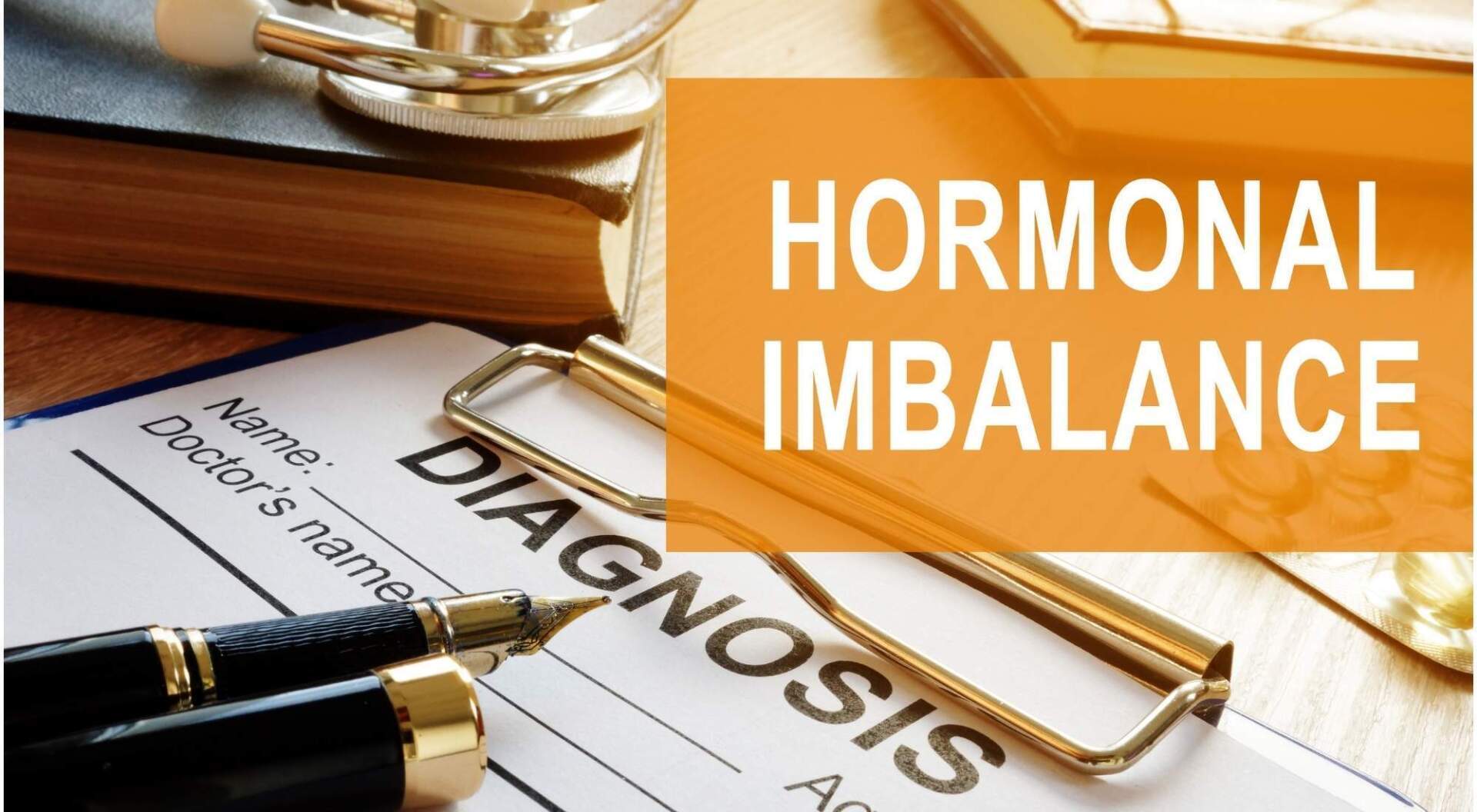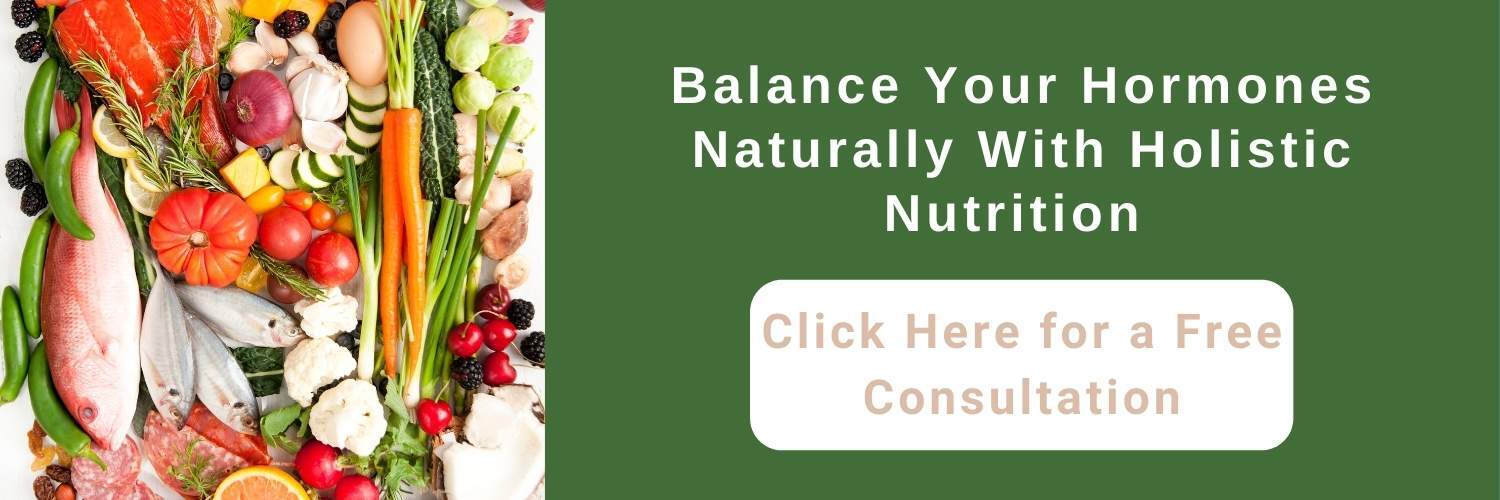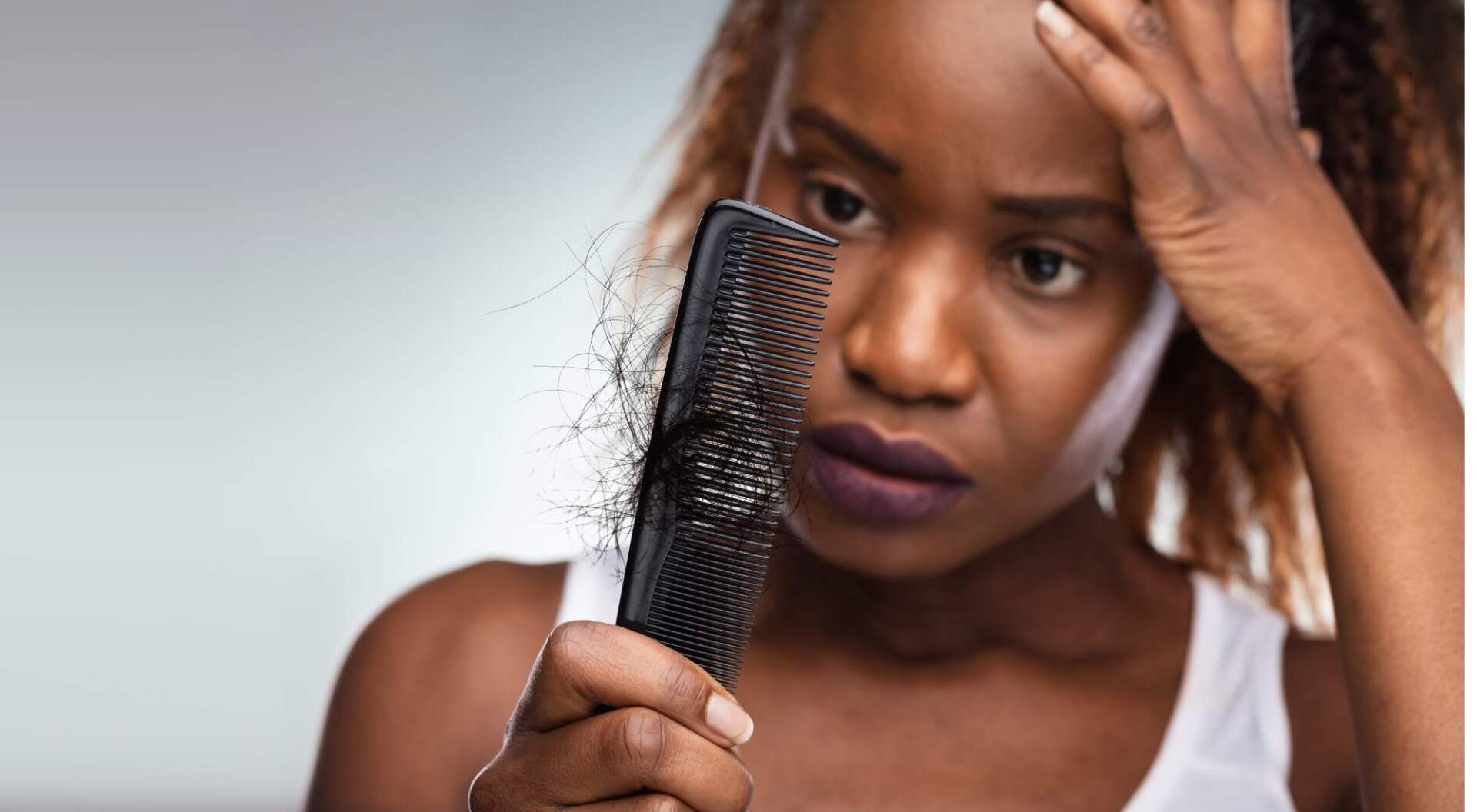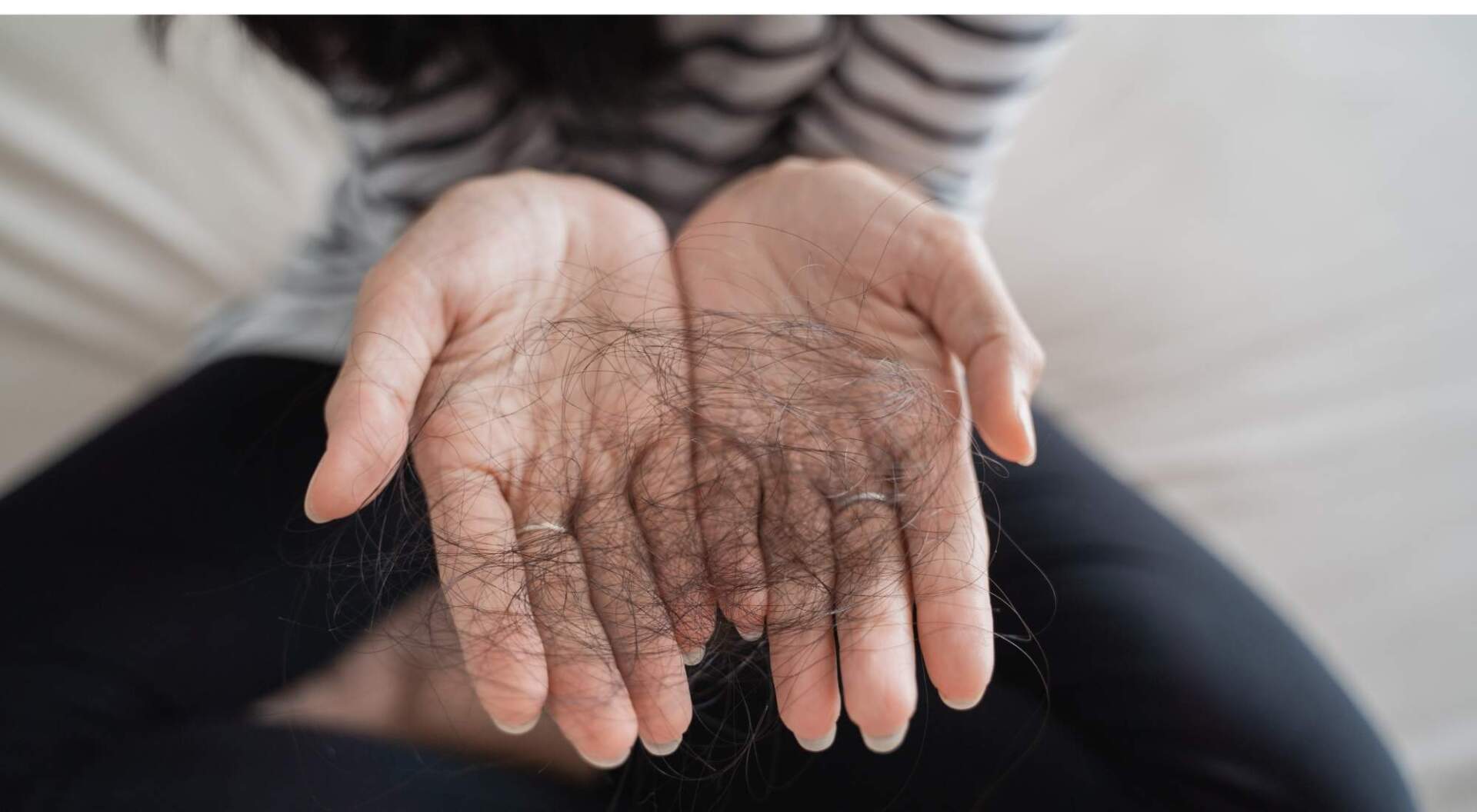Hormones and Hair Loss: Understanding the Connection
"The content below is not intended to be a substitute for professional medical advice, diagnosis, or treatment. Always seek the advice of your physician or other qualified health provider with any questions you may have regarding a medical condition."
The average person loses from 50 to 100 hairs each day.
It seems like lately, you’ve had a higher than normal amount of hair in your hairbrush each morning.
You’ve heard hair loss can be the result of a hormone imbalance and are wondering if there may be a connection between your hair loss and your hormones?
Read on to learn about hair loss, hormones, and how holistic nutrition can help.
Table of Contents
What Hormones Are Responsible for Hair Growth?
In a healthy individual, hair grows at a rate of around ½ inch each month, or the equivalent of 6 inches per year.
While the speed at which your hair grows is dependent on a variety of factors, hormones play a huge role.
The hormones involved in hair growth include:
- Androgens
- Estradiol
- Progesterone
- Prolactin
- Thyroid gland hormones
- Melatonin
- Corticotropin-releasing hormone (CRH)
- Adrenocorticotropic hormone (ACTH)
- Thyrotropin-releasing hormone (TRH)
- Cortisol
- Galanin (GAL)
Can Hormone Imbalance Cause Hair Loss?
A 2020 study published in the International Journal of Molecular Sciences reveals that both the hair cycle and hair follicle structure are highly affected by hormone levels.
“Can hormone imbalance cause hair loss?”
Definitely.
In fact, an imbalance of hormones is the most common cause of hair loss in both men and women.
And in both sexes, the incidence of hair loss increases with age.
If you are concerned about current or future hair loss,
Nutrition Response Testing at HealthierU can identify any hormonal imbalance you may have and determine the exact lifestyle and dietary changes you need to make to restore your hair growth.
What Hormones Cause Hair Loss in Females?
Hormonal imbalance hair loss in females is the result of unbalanced levels of:
- Estrogen
- Progesterone; and
- Testosterone
Hair loss with hormone imbalance is partly genetic, so a woman’s risk of hair loss is higher if other female family members have also experienced hair loss.
What Hormones Cause Hair Loss in Males?
If you are a man, the stats for maintaining a full head of hair can look grim.
Approximately 35 million men in the United States will suffer some type of hair loss during their lifetime.
And roughly 25 percent of men with hereditary male pattern baldness (androgenetic alopecia) begin losing their hair before their 21st birthday.
By the time they reach 35, around 66 percent of all men will have some degree of hair loss.
While genetics play a major role in hair loss, hormones are also a huge piece of the hair loss puzzle.
Ultimately,
testosterone and thyroid levels are to blame
for hormonal imbalance hair loss in men.
Hormonal Imbalance Hair Loss: 4 Common Causes
Hormonal imbalance hair loss can occur for a wide variety of reasons.
Sometimes it is triggered by hormonal changes, such as pregnancy or menopause.
In other cases, factors such as stress or irregular thyroid levels may be affecting your hairline.
Let’s take a look at the 4 most common causes of hair loss with hormone imbalance.
#1: Irregular Thyroid Levels
Located in the front of your neck, your thyroid gland releases 2 hormones:
- Triiodothyronine (T3); and
- Thyroxine (T4)
These two hormones play a huge role in the regulation of pretty much every process in your body, including how well your hair does or doesn’t grow.
When your thyroid is not underactive, as it is with hypothyroidism, for example, your metabolism can slow down considerably.
And when your metabolism slows down, your hair and skin are usually the first to suffer.
If you are suffering from hypothyroidism, you will likely notice your hair is:
- Dry
- Brittle
- Dull and lacking its normal shine
- Thin; and
- Falling out at a higher rate than normal
Hypothyroidism can even cause dramatic thinning of your eyebrows.
If your thyroid hormones are overactive, as it is in individuals with hypothyroidism, you will also likely experience hair loss.
But great news.
In most cases of hair loss with hormone imbalance due to irregular thyroid levels, the hair grows back once the thyroid levels are regulated.
#2: Pregnancy
One look at a pregnant woman, and you will immediately notice that “pregnancy glow.”
Not only does her skin look healthy and radiant — her hair looks extra soft and shiny.
During pregnancy, the body ups its levels of progesterone and estradiol (a form of estrogen) - both of which are amazing for your hair.
But don’t get too excited.
Fast-forward to around 3 months postpartum, when progesterone and estradiol levels undergo a monumental decrease as they head back to pre-pregnancy levels.
Those lovely locks suddenly start to come out in clumps, bringing with them the fear that the loss of hair will never stop.
While pregnancy hormones are different for every woman, generally any hair lost during the postpartum months will eventually grow back.
#3: Menopause
Female pattern hair loss and facial hirsutism (the growth of excessive dark or coarse hair in a male-like pattern) can often be seen in menopausal women.
The reason for this?
You guessed it, … hormones.
During menopause, a woman’s estrogen and progesterone levels drop dramatically.
The male hormone, testosterone, also undergoes a more gradual decrease.
Each of these hormones affects hair growth differently.
For example, estrogen increases the length of time a strand of hair spends in the growing phase. So when estrogen levels drop, hair growth decreases.
Women going through menopause will frequently notice an overall thinning of their hair, that may be particularly visible by a thinner ponytail or wider part.
Without hormone replacement therapy, hormonal imbalance hair loss in menopause will continue throughout a woman’s life span.
#4: Stress
It’s no secret that stress takes its toll on your body.
But did you know that stress can lead to hormonal imbalance hair loss?
There are 3 types of hair loss associated with elevated levels of stress:
- Alopecia areata - In alopecia areata, the body’s immune system attacks the hair follicles — resulting in substantial loss of hair.
- Telogen effluvium - Here, excessive stress pushes many of the hair follicles into a phase of “resting,” which results in the gradual loss of hair.
- Trichotillomania - This disorder results in an irresistible urge to pull out the hair of your scalp, eyebrows, or other areas of the body. It may be a way of dealing with negative emotions, such as stress, tension, boredom, or loneliness.
Thankfully, hormonal imbalance hair loss caused by stress doesn’t have to be a permanent condition.
Once the stress is under control, the lost hair will frequently grow back.
4 Things That Can Help Prevent Hormonal Imbalance Hair Loss
Can hormone imbalance cause hair loss?
For sure.
But the great news is that there are things you can do to slow or reverse hormonal imbalance hair loss.
#1: A Healthy Diet
You are what you eat.
And this is never more true than when it comes to hormonal imbalance.
Hair loss due to hormones that are out of whack can be greatly improved by eating a diet that consists of the following foods:
- Eggs
- Spinach
- Berries
- Fish, including salmon, herring, and mackerel
- Sweet potatoes
- Nuts and seeds
- Avocados
#2: Lower Stress Levels
Managing your stress levels can do wonders when it comes to winning the battle of hair loss with hormone imbalance.
When we are stressed out, our adrenal glands produce extra levels of cortisol.
As a steroid hormone whose job is to regulate many processes within the body — including your metabolism and immune response — cortisol plays a critical part in helping the body respond to stress.
While cortisol is super-beneficial to the body at normal levels, too much cortisol will cause hair follicles to shift out of the normal growth phase, and fall out.
If you’re looking for ways to reduce the stress in your life, try some of these ideas:
- Deep breathing
- Prayer or meditation
- Progressive muscle relaxation
- Relaxation to music
- Counseling
- Engaging in hobbies
- Biofeedback
#3: Vitamin D
Also known as the “sunshine vitamin,” vitamin D can help remedy hormonal imbalance hair loss by stimulating both old and new hair follicles.
A study in the Indian Dermatology Online Journal revealed that a lack of vitamin D within the body may lead to hair loss.
So, if there isn’t enough vitamin D in your system, your growth of new hair can be stunted.
Ideally, the bulk of vitamin D will be through exposure to sunshine or foods such as:
- Egg yolks
- Beef liver
- Salmon (and other fatty fish)
- Cheese
- Mushrooms
Additionally, supplements can be a helpful choice in boosting the body’s levels of vitamin D to remedy hormonal imbalance hair loss.
#4: Boost in Iron Levels
Low iron, which may result in anemia, is a known cause of hormonal imbalance hair loss.
Iron supplements are always an option, but they tend to have a bad reputation for resulting in constipation.
Therefore, using food to boost your levels of iron may very well be your best option.
Some great iron-rich food choices include:
- Leafy green veggies
- Dark chocolate
- Cocoa powder
- Oats
- Wheat germ
- Beans and tofu
- Lamb
- Beef
- Pumpkin and squash seeds
- Liver
- Mollusks
If your hormonal imbalance hair loss is due to an iron deficiency, correcting the problem should result in new hair growth.
Is Hormonal Hair Loss Reversible?
Yes.
If the hormonal imbalance is corrected, hair loss due to hormonal imbalance can be reversed.
How Nutrition Response Testing With HealthierU Can Help You Overcome Hormonal Hair Loss
Can hormone imbalance cause hair loss?
Absolutely.
Do you have to live with hair loss due to hormonal imbalance?
Absolutely not.
Through Nutrition Response Testing at HealthierU, Dr. Sergi can:
- Pinpoint the cause of your hormonal imbalance hair loss
- Evaluate the way your body currently functioning in response to hormonal imbalance
- Develop a customized plan to help your body get back into balance
Get in touch with HealthierU today for your free consultation and find out how
holistic nutrition can help put an end to your hair loss.






